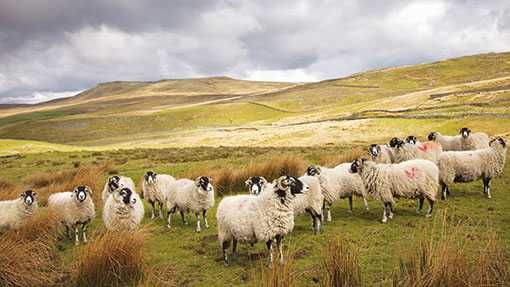Bid to resolve deadlock over hill farm support

Industry leaders say they are determined to find a way forward amid claims that England’s hill farmers will bear the brunt of reduced support payments under CAP reform.
Farmers above the moorland line fear they face disproportionate reductions compared with lowland producers from lower direct payments and the end of environmental stewardship following the implementation of CAP reform measures from 2015.
The government delayed a decision on a higher moorland rate aimed at easing the pain after the NFU described the planned 82.53% uplift in payments as “disproportionately large” – causing consternation among upland farmers and interest groups.
Hill farmers acknowledge that an 82.53% uplift sounds big, but argue that it is from a low base and would still fail to offset the loss of upland stewardship income. They also argue that upland farmers are more dependent than their lowland counterparts on income from support payments.
Julia Aglionby, chairman of the Foundation for Common Land, said the loss of upland stewardship without a commensurate uplift in the moorland basic payment would “bring real hardship for hill farmers and a decline in the public benefits that farming provides for society.”
“We are treading a fine line, but we don’t want to antagonise the lowlands into thinking hill farmers want to take money off them.”
Robin Milton, NFU uplands group chairman
DEFRA proposals to increase the moorland rate to €62/ha would go some way to mitigate income losses, said Ms Aglionby. “We urge government to, as a minimum, confirm this uplift that brings immense value to the taxpayer through the management of our most valued countryside.”
Some 30 groups representing more than 2,500 hill farmers met to discuss the issue at Penrith, Cumbria, on Tuesday (14 January). Attendees included NFU uplands group chairman Robin Milton and NFU president Peter Kendall.
Mr Milton said it was important to ensure any CAP funding reductions were fair and proportionate. “Hill farmers want to know we have been listened to,” he said. “We are treading a fine line, but we don’t want to antagonise the lowlands into thinking hill farmers want to take money off them.”
Mr Kendall said the NFU acknowledged the vulnerability and lack of options faced by farmers trying to make a living in the uplands. “We are not afraid of making difficult decisions but we want to understand the full implications of doing so,” he said.
“As an organisation that represents the whole gamut of agriculture in England, if we are making representations for the further transfer of money, we have to make sure that farmers who face reductions know the reasons behind it.”
DEFRA is now expected to take a decision about the moorland rate this spring, after further modelling of the impact on upland farms.
(More on CAP reform)
